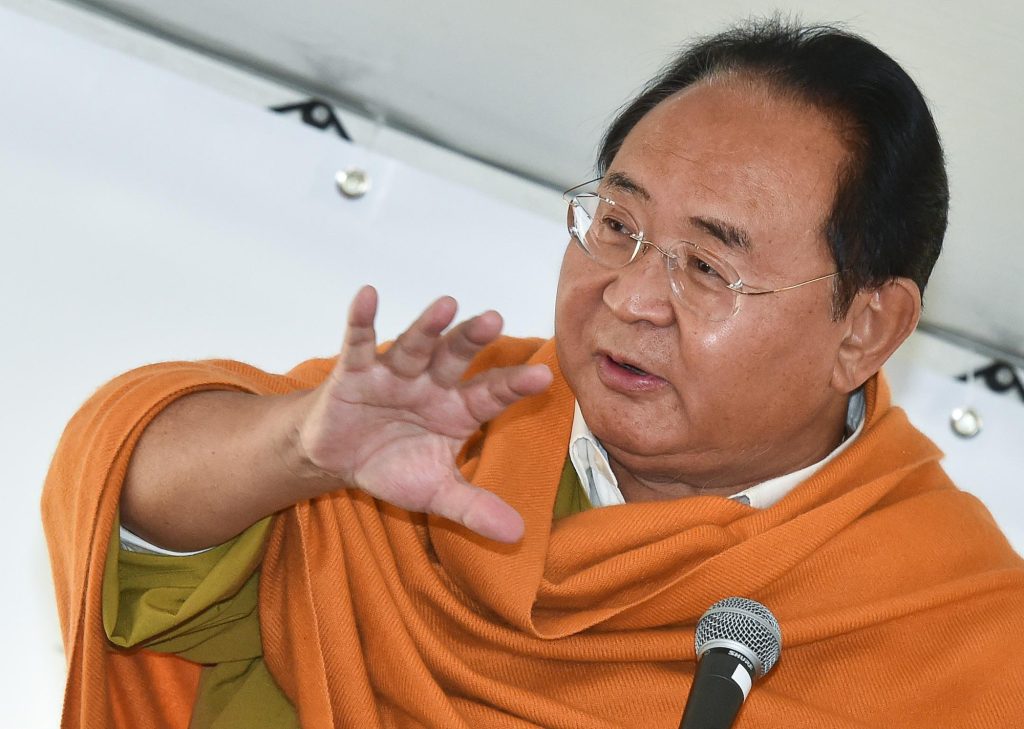In the days after Tibetan Buddhist teacher Sogyal Rinpoche’s death, his followers posted to Sogyal’s official website a number of glowing eulogies from Buddhist figures and organizations, and even the Central Tibetan Administration. The condolence messages made no mention of the allegations from several of his students of sexual, physical, and emotional abuse against Sogyal Rinpoche that led to his stepping down from Rigpa, the international Buddhist group he founded in 1979. Survivors and their supporters expressed outrage and heartbreak at the praise, arguing that these eulogies—some of which extol him as an infallible teacher—do the work of covering up Sogyal’s painful legacy. As a result, some organizations have since retracted their condolences.
Sogyal Rinpoche died on August 28, leaving behind a legacy fraught with abuse allegations. But some have chosen to focus on the positive parts of his past, such as helping spread Buddhist teachings to the West with Rigpa and his popular book, The Tibetan Book of Living and Dying.
Many people have since taken to social media to call on Buddhist teachers to retract their statements of homage to Sogyal. A change.org petition calling on the dharma teachers to take back their comments has drawn hundreds of signatures. “With all this information available, it is disturbing that you are advising us to imagine Sogyal as our guru, sending comforting blessings to us from the bardo” the petition said. “You wrote eulogies that implicitly assume that Sogyal had no victims. Your words made them disappear.”
After the Central Tibetan Administration (CTA) issued a message of condolences (originally published in Tibetan and translated on Sogyal’s website), Rob Hogendoorn, co-author of the book Sex and Violence in Tibetan Buddhism: The Rise and Fall of Sogyal Rinpoche, wrote directly to the CTA in protest, expressing his “grave concern” over the eulogy.
“All things considered, the hypocrisy of the Central Tibetan Administration stance is staggering to me,” he wrote. “How can you pose as a champion of human rights, compassion and nonviolence while publicly endorsing a known abuser? Please consider for a moment how much you would have accomplished by just keeping silent.”
On September 9, the CTA retracted their remarks, saying in a statement: “It is clear by now that our message has shocked and angered many in view of some controversies about late Sogyal Rinpoche’s personal behaviors. It was totally unintended and we hereby sincerely apologize to all those who were affected.”
The CTA’s initial letter, which has since been taken down from Sogyal’s website, said: “We are grateful for all the beneficial activities H.E. Sogyal Rinpoche has accomplished in terms of holding, preserving and spreading the dharma teachings and the Tibetan culture. Remembering such kindness, we make the strong wish that all his profound aspirations be spontaneously fulfilled without any obstacles and that his true reincarnation come swiftly, manifesting the same ability to benefit the teachings and sentient beings as his predecessor.”
The CTA is not the only institution that has retracted their statement. At the urging of members of its UK branch, the International Dzogchen Community, an organization based on the teachings of Tibetan Buddhist master Chögyal Namkhai Norbu also withdrew its eulogy, according to Hogendoorn.
Buddhist teacher Ringu Tulku offered his condolences in a Facebook post that later was reposted on Sogyal’s website as an official statement of homage. In it, he remembers his childhood friend Sogyal fondly. “I have never heard him speak badly about anybody in my life. Even when some of his trusted students attacked him with most serious accusations he did not say one bad word against them. He quietly resigned and left,” he wrote. After a flood of criticism in the post’s comment’s section, Ringu Tulku wrote in a follow-up post on September 7: “I just expressed what I saw and felt in my own heart, but I equally respect all who feel strongly against Sogyal Rinpoche. I know that some people have felt very hurt by him. I cannot judge or criticise anybody because I know that people have different perspectives. It is futile to argue.”
Others are looking to create something beneficial for the future from the trail of abuse that Sogyal left behind. Buddhist chaplain Jack Wicks, one of the founders of the new initiative the Alliance for Buddhist Ethics which emerged in part from the work of Rigpa survivors, told Tricycle, “Ironically, Sogyal said it himself—in his audio message to the Australian Sangha from January 2018 [after the allegations resurfaced]. He says that he prays ‘that something really good can come of all this.’ Let’s hope he’s right—let’s hope this is a tipping point, a moment in time at which we start to see a change for the better.”
Sogyal had been dogged by accusations of mistreatment since the early 1990s, but the claims gained renewed attention in 2017 when a group of his current and former students published a letter detailing the abuse that they had suffered as senior members of Rigpa. A law firm hired by Rigpa to investigate the allegations released a report in September 2018 that verified many of the claims of abuse.
Thank you for subscribing to Tricycle! As a nonprofit, we depend on readers like you to keep Buddhist teachings and practices widely available.
